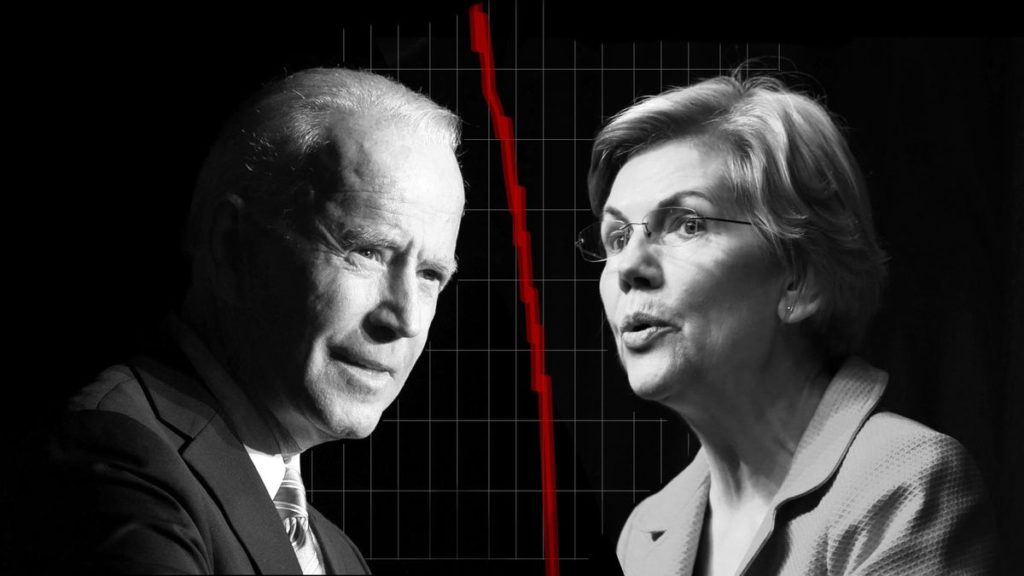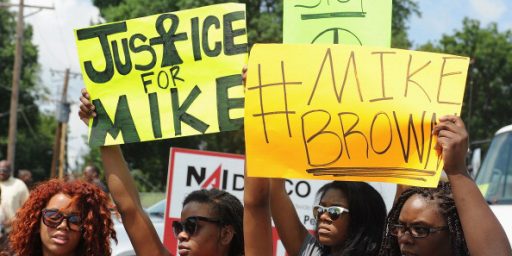1975 Warren vs 1975 Biden on Busing
A law review article written when the former was a student provides an interesting contrast.

The dust-up between Kamala Harris and Joe Biden over the latter’s opposition to busing as a tool for desegregation was the highlight of the first round of Democratic debates. It was also unfair, in that Biden is the only candidate on the stage who was in office and had to stake out a position on that controversial issue. But it turns out that another leading candidate weighed in as well.
CNN discovered that “Elizabeth Warren’s first law review article blasted an anti-busing court ruling.”
In her first law review article, published in 1975 in the Rutgers Law Review and recently unearthed by CNN’s KFile, Warren sharply criticized a Supreme Court ruling in the case Milliken v. Bradley, writing that it made it easier for school districts to stop busing students in northern cities.
Warren’s law review article sheds light on a previously unexplored early career stance on busing that contrasts with Biden’s approach during the same time period. Biden defended his past position in an exclusive interview with CNN this week.
[…]
Her first article, according to Justin Driver, a professor of law at Yale School of Law, showed a remarkable understanding of the complexities in education law.
It was an “extremely accomplished piece of scholarship by a student,” said Driver. “She has plainly done her homework.”[…]
In the article, Warren predicted that de facto segregation — segregation that occurs not because it was institutionalized by the government but because of social norms, prejudices and self-selection — and de jure — segregation that existed because of laws that mandated racial segregation — had been silently “reaffirming” by the court and would take over American public schools.
The isolation of minorities in urban centers, Warren wrote, and a shrinking tax base to finance public education would lead to facilities that are inferior in “student-teacher ratios, and other educational advantages” for minority students. For Brown v. Board of Education to have meaning in northern urban centers, Warren said that “effectively separate schools, even if equal, and certainly if unequal, are condemned by the Constitution, regardless of the reason for the separation.”
[…]
Warren also seemed to recognize the significance of Milliken in her law review article. She argued that without proper oversight from the federal court system, she wrote, the burden of desegregation has fallen on to black communities.
“It has been black parents, children, and organizations committed to desegregation who have shouldered the major part of the burden…Clearly, the burden for enforcing the Brown right has been misplaced,” Warren wrote.
Warren wrote that the Millikenruling, coupled with another ruling that upheld the state system of financing public schools by local taxes, “will lead to central-city schools which are inferior in facilities, student-teacher ratios, and other educational advantages because the funding is not commensurate with that available for suburban schools.”
Erika K. Wilson, a professor of public policy at the University of North Carolina School of Law, said that Warren’s predictions for what would occur in the American education system largely came true and that her view was closely aligned with Justice Thurgood Marshall, who wrote a dissenting opinion in Milliken. America’s school systems would become “irreparably segregated,” said Wilson.
Warren, noted Wilson, might have been out of step with her contemporaries at the time, and particularly “out of step” with white Americans who were “tired” of the decades-long battle to integrate public schools.
[…]
As Warren was writing on busing, at the same time in the 1970s, Biden, as a young senator, stood against busing in places with de facto segregation like Detroit. He criticized the courts for using the terms desegregation and integration interchangeably, seeming to side with the very Supreme Court decision Warren wrote against.
“There is a conceptual difference between desegregation and integration,”Biden said to Wilmington, Delaware’s, daily newspaper, The News Journal, in 1975. Biden further explained that he supported desegregation by any legal means at hand — including busing in cases where a school district has upheld racially segregated district lines. However, he did not support busing for all-white or all-black school districts “because of historical pattern not involving segregation practices disapproved by a court.”
“Nobody is more committed to equal educational opportunity than I,” said Biden to The Morning News, a Wilmington newspaper, in 1977. “But busing is not the way. It was a bad idea in theory, and it has turned out to be even worse in practice.”
“The majority of particularly white Americans who were tired of school desegregation saw (Milliken) as a victory and a good thing,” Wilson said.
But Warren did not. She said the decision “could thus be the ‘separate and unequal’ schools” and called on Congress to intervene.“If the Court cannot or will not develop a judicial remedy for urban school segregation, then Congress must. Equal educational opportunity requires the combined efforts of the judiciary, the legislative branch, and the administrative departments of the executive branch,” Warren concluded.
Warren got it right in terms of the impact and Biden got it right in terms of the Constitution and the politics.
Warren understood that, without extraordinary remedy, the de jure segregation of Jim Crow would be replaced by a de facto segregation of economics. I understood that, at least at the margins, contemporaneously from my grade school social studies classes. Further, as Warren thoroughly explains in the article, achieving the goals of Brown v. Board of Education required integration of the schools, not mere desegregation.
Biden is at his core a liberal and fully embraced racial equality even as a very young politician. But he was receiving pressure from his constituents, both black and white, to vote against busing.
Whites overwhelmingly opposed it for a variety of reasons. Most notably, they had made major life decisions around providing the best education they could for their children and saw busing as robbing them of that investment. And, yes, there was still widespread racism.
Blacks were much more divided, with some seeing busing as the best way to provide their kids an opportunity but others seeing it as destroying their community. There’s an argument that continues to this very day that the kids may have been better off with black principals and teachers who were deeply invested in their futures.
Regardless, we see in the article that Warren is going to be a brilliant legal mind and passionate about social justice. Biden is a very bright guy but he barely made it through law school. She’s at heart an academic and policy wonk. He’s a people person who has spent his entire adult life steeped in the practicalities of politics.
Biden is only seven years older but, while she was a student writing that article, he’d been in elected office for several years, including four in the United States Senate. I think his arguments were genuine—he’s never been disciplined enough to stick to a script—but he’s also speaking to a divided constituency, trying to keep the trust of the black community while reassuring the whites.
Rather than providing fresh insights, then, I think this contrast reveals that Warren and Biden are fundamentally the same people they were 44 years ago. They’ve both lived full, productive lives since then and presumably matured and learned along the way. But their character and personal styles remain pretty much as they were.






Upvote.
I honestly have to wonder why people are obsessing over things Biden (and Warren) said 40 years ago. As you said, the debate over bussing imposed from outside, as opposed to the kind of voluntary program that Harris benefited from, was over years ago, and bussing lost.
By and large, the reason that school districts today are segregated because of where people choose to live and there’s not much the government can (or should) do about that.
In any glance into Warren’s past, it’s worth mentioning that she was a Republican until 1996.
@Doug Mataconis: for the. Erly reason James outlined in his last paragraph.
When someone shows you who they are, believe them.
@SKI:
And in Biden’s case, I think he comes across fine even from a Democratic point of view. His criticisms of mandatory court-ordered busing were proven to be largely correct, for example, and the idiotic criticism of what he said about being able to work even with people he disagreed with strongly, in which he included the name of two staunchly segregationist Senators, was a point in his favor in my book.
@Doug Mataconis: Yes, we’re agreeing here.
Harris highlighted it to get herself into the conversation, carve away some of Biden’s support among African-American voters, and highlight Biden’s age.
I actually think Warren and Biden both acquit themselves fine here. I find the contrast fascinating, partly because it highlights who they still are.
@Kylopod:
I was only tangentially paying attention to politics in the 1970s but know the parties were much more diverse then than now. Most Southern pols were Democrats still, which remained the case in much of the South until the mid-to-late 1980s. Still, pro-busing was a minority position for Republicans even then, no?
Well, I hope Democrats get this restrospective debate out of their system soon. Whatever the merits of bussing 45 years ago the idea is a loser now and running on bussing – or giving Trump the opportunity to make it an issue – would be a massive own-goal.
@Andy:
That’s conventional white guy wisdom, which I share. Rebecca Traister would disagree.
@James Joyner:
I couldn’t tell you the numbers, but I do know that the 1972 GOP platform opposed busing.
“At the same time, we are irrevocably opposed to busing for racial balance. Such busing fails its stated objective—improved learning opportunities —while it achieves results no one wants—division within communities and hostility between classes and races. We regard it as unnecessary, counter-productive and wrong.”
https://www.presidency.ucsb.edu/documents/republican-party-platform-1972
@James Joyner:
It was a pre-planned attack, of course, and it succeeded brilliantly. I’ll give her and her campaign that much credit. Now we’ll have to wait to see what she does with it. I expect that she will come under increased scrutiny herself in the not too distant future. As I’ve said in the past, there is apparently enough in her record as District Attorney in San Francisco and Attorney General of California to give candidates willing to make use of it some ammunition. I don’t think Biden will pile on her, but it wouldn’t surprise me to see someone like Cory Booker criticize her for her offices’ records on civil liberties and criminal justice issues.
@Doug Mataconis: Families of school-age children decide where to live based on school quality which is a function on how districts allocate funding based on property taxes. So government policy is highly influential in determining where these families live. Well funded and high rated schools in term drive property values which also determine where people decide to live. Gov’t policy cannot be dismissed as a driving factor on both sides of the equation.
As a thought experiment, imagine living choices of families with children should all grade schools move to online with the teachers pay funded centrally by the district. Considerations other than school district now immediate rise in priority. I think neighborhoods see a significant amount of reformulation as zip code is no longer the primary determinant of your child getting a safe quality education.
I was bused. It was not all unicorns and lollipops. Most of the white teachers and students did not want you there. Sure you got better “academics”…but at a social price. I don’t believe many of us got a better education. Integration meant the quality black teaches left black neighborhoods for white ones taking with them a quality of mentorship that could not be replaced and certainly could not be realized in a white school. Young children DEFINITELY see color! It translates subconsciously into how they set their future aspirations. My parents neighborhood and schools had black professionals with college degrees–particularly black men. Those people or the newest generation like them now no longer live in those communities. The effect of child achievement in those zipcodes is palpable.
Biden had to dance on a razor about busing but it’s clear he actually had listened to the black side of the debate which asked: Why is the only pathway to quality education for black children only being discussed from a framework that it can only be achieved if white students are somehow involved? In other words, unless said education is being delivered by white folks to white children with Black children as a side beneficiary, the black community is SOL.
The thought processes that led to bussing as a remedy for segregation…was also on the racist side of the thought spectrum.
@Jim Brown 32:
You are aware of the fact that even in the 1970s many African-Americans objected to busing for a wide variety of reasons, including the fact that, like most parents, they prefer the idea of their children attending neighborhood schools, right?
I don’t disagree about the issues surrounding how schools are funded. In Virginia, this is less of an issue because schools tend to be governed at the county-level rather than the locality level. In New Jersey where I grew up, and in many other states, schools are governed at the city/town level which means that you’re drawing from a much smaller population and a much smaller tax base. This means that those school districts are going to demographic resemble the communities from which they draw students. Absent erasing political barriers, which I would oppose, I’m not sure what the Department of Education or the courts can do about that.
@Doug Mataconis: That is a different question/issue than what I thought you were asking.
While I don’t think it disqualifying, I do think Biden’s response was problematic in a few ways.
Stylistically, he totally screwed up. Wasn’t ready for the question. Didn’t think well on his feet. Awkwardly ended his own response by calling time on himself. Just looked old. It’s early and this is fixable but it wasn’t a good look.
Substantively, while I agree that working across the aisle with people you disagree with is a definite positive, it has two problems in terms of his response.
First, we are talking about the era of Mitch McConnell. Biden’s repeated claim that he can get stuff done across the aisle is naive at best, dangerous at worst. Hope is not a plan. What may have worked in 1982 won’t work today. Failing to recognize that is bad – both substantively and in terms of further portraying him as old and out of touch.
Second, and more to the specific point, he was talking about working with segregationists on a segregationist issue. It wasn’t about military or highway construction or a trade treaty. It was all about efforts to oppose integration. That was Harris’s point and Biden’s only response was to splutter that he had a good clvi rights record. As Jim Brown 32 and you note, there was a good substantive defense on why he took the position he did. He didn’t give it. He made a state’s rights argument.
Finally, I’m not sure Doug that your take on how this plays out is all that relevant in the Dem primary. You are functionally a unicorn. Most Libertarians either grow out of it (recognizing that the world is complicated and a functioning economy needs taxes and regulations) or move to the GOP, trading their morality for lower taxes and reductive regulation (See Wurtzel or Shaw). You are too intellectually honest to do the latter but somehow haven’t done the former.
@Doug Mataconis: I’m pretty sure you and @Jim Brown 32 are in rough agreement on this one.
@SKI:
Have you seen him discuss the issue in his recent interview with CNN or in other forums where he has more than a minute to respond?
This is the problem with multi-candidate “debates.” They are worthless in terms of allowing candidates actually discuss serious issues and biased toward zingers and short talking points.
@SKI:
What evidence do you have that Biden was referring to busing when he was talking about working with people like Talmadge? I’ve seen that clip dozens of times and he doesn’t mention busing, or anything related to racial issues that were the subject of political debate in the early 1970s, at all.
@Doug Mataconis:
Here in Colorado funding is “equalized” across the state according to a formula under legislation enacted in 1994. The exception to this is capital project funding which is still handled locally (although localities can get grants from the state government). For everything else, the state adds funds to each district based on a formula and part of this formula includes additional funds for schools with poor/at-risk students. Each district is guaranteed a minimum amount regardless. Under this formula, the largest differences is funding between districts are due to cost-of-living and personnel costs. Since labor is by far the biggest cost in education, the formula takes into account the need to hire personnel at locally competitive rates.
Once allocated, districts have pretty wide latitude in determining how to spend their allotted dollars.
However, funding here is not unlimited obviously – there is also a “budget stabilization factor” that reduces each district’s per-pupil amount based on total education revenue available. Colorado has TABOR, revenues have not kept up and thus Colorado has below-average per-pupil education funding – that “cost” is also shared among all of Colorado’s school districts.
Anyway, the gist of this is that what we’ve learned in Colorado is that normalizing funding across the state has not lessened the education outcome and performance differences. Parents with the ability and means still self-select by moving to the highest-performing school districts, even though those districts may often get less per-pupil funds. Likewise, high-performing districts tend to attract the most educational and administrative talent. I think this adds to the body of evidence there is not a strong correlation (if any) between funding levels and outcomes. Parental decisions and involvement still seem to be the biggest factor in a child’s educational success or failure.
@Andy: There is not much data that shows that busing raised achievement. It did provide some opportunities, course offerings, and activities that were not available at the inner city schools.
The parents and students who were bused felt disconnected from their neighborhood school. Often students were assigned to a rival school with some bad results: turmoil and friction to put it mildly. And think about starting and ending each day with an hour or more bus ride.
But busing lost favor and faded away with the magnet school choice concept, and test scores became the priority: “teach the test”. Schools had a new marker to meet: test scores, not race percentages.
There are excellent inner city schools. How is this done? A no nonsense focus on high achievement and accountability – of students, parents, and teachers. No fad education stuff (whole language, Common Core), or excuses.
We have seen the increasing trend of judges, lawyers, and career bureaucrats telling excellent teachers with years of experience and advanced degrees how to run their classrooms. I would ask them how much time that they have spent in an actual classroom. School board members should be required to spend at least a week a year working in a classroom beside the teacher: and that includes early bus duty, after-school workshops, selling tickets at the games, cleaning the gym after the games, cafeteria duty during their lunch time, and grading papers at night and weekends.
In many school systems, the teachers are treated like unskilled labor.
@Tyrell:
Thanks for that. I was in grade school at the time in a Denver suburb, which never had mandatory busing. I do remember some talk about it and my reaction was sadness that I would be split up from all my friends.
I agree with you about what makes a successful school and you’re completely correct that inner-city schools aren’t automatically bad schools.
@Andy:
Equal funding may not be enough — some schools have larger problems that require more funding.
I’m not saying “let’s just throw more money at the worst schools willy nilly”, but where there are identifiable problems that can be remedied, then we should be funding those remedies. But it should be evidence based, either tried and tested programs, or carefully measured experiments.
If, for instance, a school has a lot of kids of immigrants, they might need a program that provides free tutors in English to get those kids up to the level of the richer, whiter school district next door. That ends up being more expensive.
@Doug Mataconis:
If the districts were larger, then they wouldn’t be so segregated. The schools still might be, but the districts themselves wouldn’t be. This might be solving the wrong problem, but it might also allow resources to go where they are needed.
The government is all over school segregation — segregation by income as well as race — and putting so much power at the most local level makes the effects of that segregation worse.
@Doug Mataconis:
Biden worked with segregationists with busing because busing was incredibly unpopular at the time. And effective Senators works with and have personal relationships with all kinds of senators. Ted Kennedy worked with Conservative senators to pass Campaign Reform and immigration reform.
That’s one the reasons why so few Senators were directly elected to the Presidency, and the few that did were inexperienced.
“There is a conceptual difference between desegregation and integration,”Biden said to Wilmington, Delaware’s, daily newspaper, The News Journal, in 1975.
Whatever could that mean except that white people without any bones in their body of the racist sort could be fine with white flight and doing everything you can to not be around black people?
Like when Obama went too far and said Trayvon Martin could have been his son, it’s clear that Kamala Harris went too far for a different type of white person and pointed out that the post-civil rights era was a mess of white people pretending to be anti-racist.
It wasn’t Biden’s fault, really. He’s just a hack. But anyone who thinks that what happened after the civil rights act was a white-black compromise about integration is an idiot. It’s like saying the era following Reconstruction was a compromise between blacks and whites in the south.
@Jim Brown 32:
Not always. I remember picking my daughter up at day camp and she was talking about various counselors milling around, none of whom I knew. So I tried to get her to point out who she was talking about in this diverse gaggle of high school kids working as counselors. As it happened the counselor she was referring to was black, but she literally never mentioned that descriptor. Tall or short, nice or cranky, cool or not cool, wearing this or that, but not skin color. I saw an easy way to differentiate, and she did not.
Maybe that’s because the daughter in question is ethnically Chinese not white, but race was not mentioned, perhaps not really perceived. I wanted an answer and had to stop myself asking, ‘the white one or the black one?’ Not that I expected her to remain that naive forever, but I’d be goddamned if I was going to be the one to teach her that’s how humans are often differentiated.
It was a learning moment for me. My wife and I don’t describe people by race ‘s unless it’s relevant and my take-away was that kids often see things in terms outlined for them by their parents – and then impose those limits back on the parents.
@Gustopher:
The problem is not school discrimination, but housing discrimination. School is segregated because Blacks and Whites live in segregated areas. The problem of busing is that it tries to fix the smoke coming from the fire, not the fire.
@Gustopher:
I agree with all of that (and Colorado does have additional support in those and other areas), but it seems to me the experience over the last 40 years has largely been to throw more money at the problem. We spend about 3X as much in real dollars on primary and secondary education from when I was a kid, and I can see several improvements, but I don’t think we’re getting good value for what we spend.
I don’t have any solutions, but I do think education generally today is far too focused on college prep. There are tons of opportunities for those who excel at intellectual pursuits and book learning and practically none for anyone else.
@Jim Brown 32:
I had a comment on the just previous Kamala Harris/busing post that got tangled up in the filter and I just let it go. But you might find the link I got my information from of interesting
Telling the untold stories of school integration: An interview with Vanessa Siddle Walker
Walker is an Emory University professor with several books on schooling and Black leaders in education prior to desegregation. As part of the linked interview, she comments on the desegregation that resulted in Black schools being shutdown and Black educators being put out of a job. She hints at nefarious actions, possible, but also when you merge two organizations into one, one of the previous organizations is going to come out on the short end as she discusses when the Georgia Educational Association (White) and the Georgia Educational and Teachers Association (Black) merged as required by their parent organization, the NEA in 1970. Unfortunately, that did mean Black students lost teachers and mentors to which previous generations had access.
@michael reynolds: I might be worried that your kid is learning that race should just never be acknowledged, and that being black is something to be ashamed of or pitied.
Just like how in polite company you don’t describe someone as “the fat guy with the bad combover,” and you instead say “the guy with the red tie.”
@michael reynolds: Its probably not as pronounced as it used to be because there are so many ways kids have to be exposed to members of their race living successful lives. However, if mostly what a kid sees (at least a minority kid) is members of their race occupying the lower social strata and members of the majority at the mid and upper social strata….it has a subconscious effect on how high they place their own aspirations.
There was the famous psychology study done with both blackb and white children describing attributes to black and white dolls. You’re probably familiar with it…in short, both Groups described the white dolls positively and the black dolls negatively.
@JKB: Most of these unintended consequences to policy can be mitigated if we continually ask ourselves what problem are we solving. That wasn’t done. The problem was increasingly the quality of education….not speeding integration